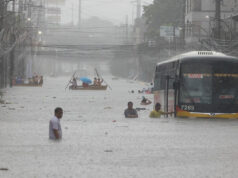FPH chief hits banks for supporting coal plants
By Victor V. Saulon, Sub-Editor
CEBU CITY — Local banks continue to extend loans to new coal-fired power plant projects despite the Philippines being directly hit by climate change, the chairman of Lopez-led First Philippine Holdings Corp. (FPH) said.
Federico R. Lopez, who is also FPH chief executive officer, said banks are “tripping over each other” in extending loans to coal power plants even if they recognize that burning the fossil fuel means emitting greenhouse gases.
“Coal-fired power plants, being the easiest to develop and its fuel supply the simplest to procure, every competitor and new entrant is seeking to build more coal-fired power plants in a vicious race to the bottom,” he told participants of the second Philippine Environment Summit in Lahug, Cebu City on Thursday.
“Adding to these pressures is the fact that majority of banks continue to finance coal production and coal-fired power generation,” he said.
“In fact, major banks financed the top 120 coal plant developers by more than $600 billion over the last four years. They’ve been slow to embrace COP (Conference of Parties) 21 despite verbal pronouncements and still have quite a way to go,” he said, referring to the conference in Paris in 2015 that agreed to limit greenhouse gas emissions and slow down the rise in the earth’s temperature.
He said if banks transitioned away from coal there would be a shift toward lower carbon alternatives, renewable energy (RE) sources and even the adoption of energy efficiency measures.
Mr. Lopez also called out the government for its short-term perspective and ambivalence about climate change issues.
“Despite our countrymen’s vulnerability to the effects of global warming, only token importance is given to such concerns in national public policy. Priority is power adequacy and cheap electricity prices,” he said.
Mr. Lopez said the recent initiative to impose a coal tax is a step in the right direction but would only amount to as little as P0.01 to P0.03 per kilowatt-hour (kWh) tariffs to coal-fired power plants.
He said in other countries such as India, the coal tax is equivalent to P0.06 per kWh. South Korea’s tax on the fuel even reached P0.25 per kWh.
Mr. Lopez, who also chairs FPH units First Gen Corp. and Energy Development Corp. (EDC), said his group faces “quite a number of challenges” in the Philippines. First Gen produces power using natural gas while EDC’s output comes from geothermal plants.
He noted price competition is intense, and retail competition and open access is underway. Low price is still the main driver of electricity for consumers, he added.
“This has driven down profit margins of all power producers. But we’re driving down costs in our geothermal business, both the old fashioned way and through the use of new technology,” he said.
Despite the obstacles, Mr. Lopez said the companies he chairs are committed to a “green road.”
“There are more and more companies that are conscious about greening their footprints and supply chains. This has a lot to do with the millennial consumer coming of age. In the Philippines we’ve been seeing some electricity customers specifically coming to us because they want to green their supply chains with renewable power,” he said.
He said another reason why the Lopez group is committed to its green energy platform is the country’s competitive market.
“The Philippines is primarily a services-driven economy. Retail competition and open access that’s underway and progressing will disaggregate that demand. Our portfolio that blends flexible natural gas-fired plants and geothermal, which is the only competitive 24/7 RE technology today, is a better combination for serving this type of demand called mid-merit,” he said.
He said natural gas and geothermal, which respectively have only a third or a tenth of the carbon emissions of even the most advanced coal plants, are capable of beating the latter’s prices.
“Another reason for optimism about clean energy is that the forces of technology moving very fast. Solar, wind, and battery storage have experienced exponential cost reductions over the last few years. Never in my 20 years in the power industry have I seen anything move so fast,” he said.
Given the rapid pace of renewable energy development, Mr. Lopez said coal-fired power plants “can’t keep up with that kind of variability and may likely end up as underutilized or stranded assets in 10 years or less.”
“In countries like Australia, Germany, and some US states like California with even modest renewable energy penetration they are already experiencing coal and even gas plants being utilized less or being idled,” he said.



